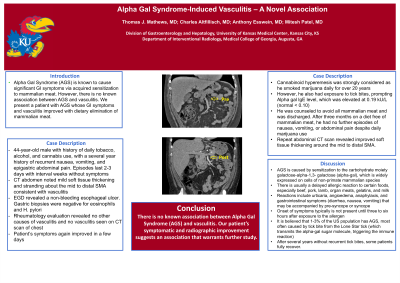Sunday Poster Session
Category: Small Intestine
P1294 - Alpha Gal Syndrome-Induced Vasculitis
Sunday, October 22, 2023
3:30 PM - 7:00 PM PT
Location: Exhibit Hall

Has Audio
- TM
Thomas J. Mathews, MD
University of Kansas Medical Center
Kansas City, MO
Presenting Author(s)
Award: Presidential Poster Award
Thomas J.. Mathews, MD1, Charlie Altfillisch, MD2, Mitesh Patel, MD3, Anthony Esswein, MD4
1University of Kansas Medical Center, Kansas City, MO; 2University of Kansas Medical Center, Kansas City, KS; 3University of Kansas, Kansas City, KS; 4Medical College of Georgia, Augustta, GA
Introduction: Alpha Gal Syndrome (AGS) is known to cause significant GI symptoms via acquired sensitization to mammalian meat. However, there is no known association between AGS and vasculitis. We present a patient with AGS whose GI symptoms and vasculitis improved with dietary elimination of mammalian meat.
Case Description/Methods: Our patient is a 44 y.o. male with history of daily tobacco, alcohol, and cannabis use, with a several year history of recurrent nausea, vomiting, and epigastric abdominal pain. Episodes last 2-3 days with interval weeks without symptoms.
CT abdomen noted mild soft tissue thickening and stranding about the mid to distal SMA consistent with vasculitis. EGD revealed a non-bleeding esophageal ulcer. Gastric biopsies were negative for eosinophils and H. pylori. Rheumatology evaluation revealed no other causes of vasculitis and no vasculitis seen on CT scan of chest. His symptoms again improved in a few days.
Cannabinoid hyperemesis was strongly considered as he smoked marijuana daily for over 20 years. However, he also had exposure to tick bites, prompting Alpha gal IgE level, which was elevated at 0.19 kU/L (normal less than 0.10). He was counseled to avoid all mammalian meat and was discharged. After three months on a diet free of mammalian meat, he had no further episodes of nausea, vomiting, or abdominal pain despite daily marijuana use. Repeat abdominal CT scan revealed improved soft tissue thickening around the mid to distal SMA.
Discussion: AGS is caused by sensitization to the carbohydrate moiety galactose-alpha-1,3- galactose (alpha-gal), which is widely expressed on cells of non-primate mammalian species. There is usually a delayed allergic reaction to certain foods, especially beef, pork, lamb, organ meats, gelatins, and milk. Reactions include urticaria, angioedema, anaphylaxis, and gastrointestinal symptoms (diarrhea, nausea, vomiting) that may be accompanied by pre-syncope or syncope. The onset of symptoms typically is not present until three to six hours after exposure to the allergen. It is believed that 1-3% of the US population has AGS, most often caused by tick bite from the Lone Star tick (which transmits the alpha-gal sugar molecule, triggering the immune reaction). After several years without recurrent tick bites, some patients fully recover.
There is no known association between Alpha Gal Syndrome (AGS) and vasculitis. Our patient’s symptomatic and radiographic improvement suggests an association that warrants further study.

Disclosures:
Thomas J.. Mathews, MD1, Charlie Altfillisch, MD2, Mitesh Patel, MD3, Anthony Esswein, MD4. P1294 - Alpha Gal Syndrome-Induced Vasculitis, ACG 2023 Annual Scientific Meeting Abstracts. Vancouver, BC, Canada: American College of Gastroenterology.
Thomas J.. Mathews, MD1, Charlie Altfillisch, MD2, Mitesh Patel, MD3, Anthony Esswein, MD4
1University of Kansas Medical Center, Kansas City, MO; 2University of Kansas Medical Center, Kansas City, KS; 3University of Kansas, Kansas City, KS; 4Medical College of Georgia, Augustta, GA
Introduction: Alpha Gal Syndrome (AGS) is known to cause significant GI symptoms via acquired sensitization to mammalian meat. However, there is no known association between AGS and vasculitis. We present a patient with AGS whose GI symptoms and vasculitis improved with dietary elimination of mammalian meat.
Case Description/Methods: Our patient is a 44 y.o. male with history of daily tobacco, alcohol, and cannabis use, with a several year history of recurrent nausea, vomiting, and epigastric abdominal pain. Episodes last 2-3 days with interval weeks without symptoms.
CT abdomen noted mild soft tissue thickening and stranding about the mid to distal SMA consistent with vasculitis. EGD revealed a non-bleeding esophageal ulcer. Gastric biopsies were negative for eosinophils and H. pylori. Rheumatology evaluation revealed no other causes of vasculitis and no vasculitis seen on CT scan of chest. His symptoms again improved in a few days.
Cannabinoid hyperemesis was strongly considered as he smoked marijuana daily for over 20 years. However, he also had exposure to tick bites, prompting Alpha gal IgE level, which was elevated at 0.19 kU/L (normal less than 0.10). He was counseled to avoid all mammalian meat and was discharged. After three months on a diet free of mammalian meat, he had no further episodes of nausea, vomiting, or abdominal pain despite daily marijuana use. Repeat abdominal CT scan revealed improved soft tissue thickening around the mid to distal SMA.
Discussion: AGS is caused by sensitization to the carbohydrate moiety galactose-alpha-1,3- galactose (alpha-gal), which is widely expressed on cells of non-primate mammalian species. There is usually a delayed allergic reaction to certain foods, especially beef, pork, lamb, organ meats, gelatins, and milk. Reactions include urticaria, angioedema, anaphylaxis, and gastrointestinal symptoms (diarrhea, nausea, vomiting) that may be accompanied by pre-syncope or syncope. The onset of symptoms typically is not present until three to six hours after exposure to the allergen. It is believed that 1-3% of the US population has AGS, most often caused by tick bite from the Lone Star tick (which transmits the alpha-gal sugar molecule, triggering the immune reaction). After several years without recurrent tick bites, some patients fully recover.
There is no known association between Alpha Gal Syndrome (AGS) and vasculitis. Our patient’s symptomatic and radiographic improvement suggests an association that warrants further study.

Figure: A. Before dietary changes
B. After dietary changes
B. After dietary changes
Disclosures:
Thomas Mathews indicated no relevant financial relationships.
Charlie Altfillisch indicated no relevant financial relationships.
Mitesh Patel indicated no relevant financial relationships.
Anthony Esswein indicated no relevant financial relationships.
Thomas J.. Mathews, MD1, Charlie Altfillisch, MD2, Mitesh Patel, MD3, Anthony Esswein, MD4. P1294 - Alpha Gal Syndrome-Induced Vasculitis, ACG 2023 Annual Scientific Meeting Abstracts. Vancouver, BC, Canada: American College of Gastroenterology.

